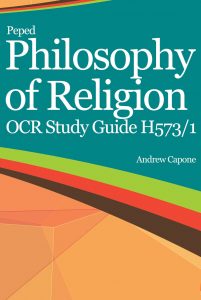Specification H573/1 The Nature of God
January 6, 2018
 We have now produced study guides for each paper which build essay-writing (analytical and evaluative skills) step by step, and together with the handouts and marked essays on the website, provide a complete method of mastering this subject. If you need a tutor, please contact me as I have a group of experienced teachers available now. peterbaron@peped.org
We have now produced study guides for each paper which build essay-writing (analytical and evaluative skills) step by step, and together with the handouts and marked essays on the website, provide a complete method of mastering this subject. If you need a tutor, please contact me as I have a group of experienced teachers available now. peterbaron@peped.org
4. Theological and Philosophical Developments: The Nature of God
Learners will examine how philosophy of religion has, over time, influenced and been influenced by developments in religious beliefs about the nature of God.
4.1 Content
• developments in the understanding of:
– omnipotence
– omniscience
– (omni)benevolence
– eternity
– free will
4.2 Knowledge
• divine power and self-imposed limitation
• divine knowledge and its interaction with temporal existence and free will
• divine benevolence and just judgement of human actions, including Boethius’s argument relating this to divine foreknowledge, eternity and free will
• divine eternity and divine action in time, including Anselm’s four-dimensionalist approach as an extension of Boethius’s view
• the extent to which human free will reasonably coexists with these attributes
• the above should be studied with reference to alternative possibilities presented by Boethius, Anselm and Swinburne
4.3 Issues as the basis of exam questions
Learners should have the opportunity to discuss issues related to developments in the understanding of the nature of God and the different possibilities presented by the key thinkers, including:
• whether or not it is possible, or necessary, to resolve the apparent conflicts between
divine attributes
• whether Boethius, Anselm or Swinburne provides the most useful understanding of
the relationship between divinity and time
• whether or not any of these thinkers are successful in resolving the problems of divine
knowledge, benevolence, justice, eternity and human free will
• whether the attributes should be understood as subject to the limits of logical
possibility or of divine self-limitation
4.4 Suggested scholarly views, academic approaches and sources of wisdom and authority
For reference, the ideas of Boethius, Anselm and Swinburne listed above can be found in:
• Boethius, Consolation of Philosophy, Book V
• Anselm, De Concordia
• Swinburne, R. the Coherence of Theism, Part II
Learners will be given credit for referring to any appropriate scholarly views, academic approaches and sources of wisdom and authority, however the following examples may prove useful:
• Matthew 19:23–26
• Vardy, P. (1999) The Puzzle of God, Harper Collins, Section 4
• Macquarrie, J. (1966) Principles of Christian Theology, SCM Press, Chapter 11






0 Comments